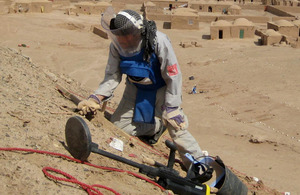UK aid to ensure that Afghanistan's Herat Province is landmine free by 2018
International Development Secretary Justine Greening pledges new British support for mine clearance charity The HALO Trust

A HALO de-mining technician at work in Herat Province, Afghanistan. Picture: The HALO Trust
The Afghan Province of Herat will be completely free of landmines in the next five years, International Development Secretary Justine Greening pledged today (4 April 2013), as she announced new British support for mine clearance charity The HALO Trust.
Speaking on International Mine Awareness Day, Justine Greening said that the support, worth £9.23m over the next five years, would enable HALO to clear all remaining landmines and unexploded ordnance in the province.
The Secretary of State said:
Afghanistan is the most densely mined country in the world, with more than a million Afghans living within 500 metres of a landmine-contaminated area.
Not only does this threaten people’s lives, it stops economic development, preventing access to agricultural land.
Today’s announcement will mean that 11,000 families in Herat will get the chance to live free from the fear of landmines, to cultivate land and to build up businesses.
Across Afghanistan, 563 square kilometres of land is still contaminated with landmines; last year, 380 Afghans were killed by landmines. 70% of them were children. Britain has supported HALO’s work in Herat since 2008; in the last five years this has enabled clearance of over 53 square kilometres of mine and unexploded ordnance contaminated land, completing 518 separate tasks and directly benefiting 172,607 families.
DFID’s grant to HALO will allow continuation of employment for more than 300 HALO demining staff, using the latest technology in mine detection, including ground-penetrating radar and also mechanical mine clearance equipment designed in Newcastle to clear the numerous minimal metal anti-tank mines laid by the Mujahidin during the Soviet occupation of Afghanistan. These mines have been preventing cultivation of very fertile areas suitable for growing a variety of crops other than poppies. Today’s announcement confirms funding to allow all known contaminated areas in the province to be cleared by March 2018.